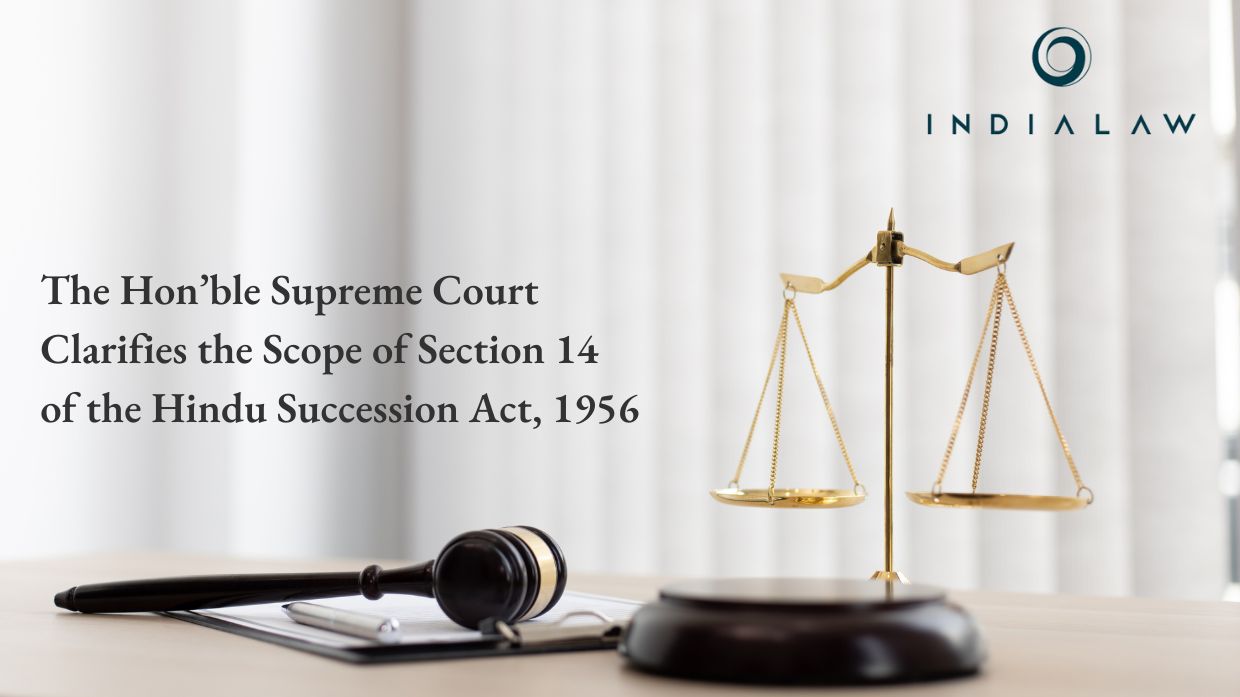The Hon’ble Supreme Court Clarifies the Scope of Section 14 of the Hindu Succession Act, 1956

The Division Bench of the Hon’ble Supreme Court (“Court”), in the case of Kallakuri Pattabhiramaswamy (Dead) Through LRs. vs. Kallakuri Kamaraju & Ors.1, delivered a landmark judgment interpreting Section 14 of the Hindu Succession Act, 1956 (“HSA”). This ruling examined whether a life interest granted to a Hindu woman under a Partition Deed could be converted into absolute ownership under Section 14(1) or remained restricted under Section 14(2) of the HSA.
Background and Factual Matrix
The dispute revolved around a 3.55-acre property granted to one Veerabhadramma, the second wife of Kallakuri Swamy, under Partition Deed dated 24th August, 1933 (“1993 Deed”). The 1993 Deed conferred a life interest to Veerabhadramma, explicitly stipulating that the property would devolve equally among Swamy’s heirs from his two marriages upon her death.
Following her demise in 1973, the Appellants, who were her sons, argued that her limited life interest had been converted into absolute ownership under Section 14(1) of the HSA. This, they claimed, allowed her to execute a will bequeathing the property to them.
The Respondents’, Swamy’s sons from his first wife, opposed this, asserting that the 1993 Deed restricted Veerabhadramma’s rights to lifetime enjoyment of the property. They contended that her rights fell under Section 14(2) of the HSA, as the deed did not recognize any antecedent right to maintenance.
The Trial Court ruled in favor of the Respondents, concluding that the property must be divided equally among Swamy’s heirs as per the 1993 Deed. On appeal, the Hon’ble High Court of Andhra Pradesh upheld the Trial Court’s findings in its judgment dated 26th March, 2009, affirming that the property was a restricted estate under Section 14(2) of the HSA.
Court’s Observations
The Court analyzed the interplay between Sections 14(1) and 14(2)2 of the HSA, relying on precedents like V. Tulsamma vs. V. Sesha Reddy3. Section 14(1) transforms property held by a Hindu woman in recognition of a pre-existing right (e.g., maintenance) into absolute ownership. However, Section 14(2) applies to property explicitly granted as a restricted estate under a legal instrument. The Court highlighted that the 1993 Deed explicitly limited Veerabhadramma’s rights to life interest, with the remainder to devolve equally among Swamy’s heirs. The Court ruled that the property granted under such conditions was outside the ambit of Section 14(1).
Further, the Court noted that Veerabhadramma’s life interest was not linked to any recognized pre-existing right to maintenance but was a new right created by the 1993 Deed. Therefore, Section 14(2) applied, and her ownership could not transform into absolute ownership under Section 14(1). The Court upheld the findings of the Trial and Hon’ble High Court of Andhra Pradesh, confirming that Veerabhadramma only had a life interest in the 3.55 acres of property, and the disputed property must devolve equally among the heirs as per the 1993 Deed.
Author’s Opinion
This judgment underscores the importance of the language and intent of legal instruments in succession disputes. This ruling provides a crucial interpretation of the Hindu Succession Act, and emphasizes the importance of precise drafting in legal documents to avoid ambiguity and disputes.
__________________________
1 Kallakuri Pattabhiramaswamy (Dead) Through LRs. vs. Kallakuri Kamaraju & Ors., Civil Appeal No. 5389 of 2012. Decided on 21st November, 2024.
2 Section 14 Property of a female Hindu to be her absolute property.
(1)Any property possessed by a female Hindu, whether acquired before or after the commencement of this Act, shall be held by her as full owner thereof and not as a limited owner. Explanation.―In this sub-section, “property” includes both movable and immovable property acquired by a female Hindu by inheritance or devise, or at a partition, or in lieu of maintenance or arrears of maintenance, or by gift from any person, whether a relative or not, before, at or after her marriage, or by her own skill or exertion, or by purchase or by prescription, or in any other manner whatsoever, and also any such property held by her as stridhana immediately before the commencement of this Act.
(2) Nothing contained in sub-section (1) shall apply to any property acquired by way of gift or under a will or any other instrument or under a decree or order of a civil court or under an award where the terms of the gift, will or other instrument or the decree, order or award prescribe a restricted estate in such property.
3 V. Tulsamma vs. V. Sesha Reddy, (1977) 3 SCC 99
By entering the email address you agree to our Privacy Policy.



